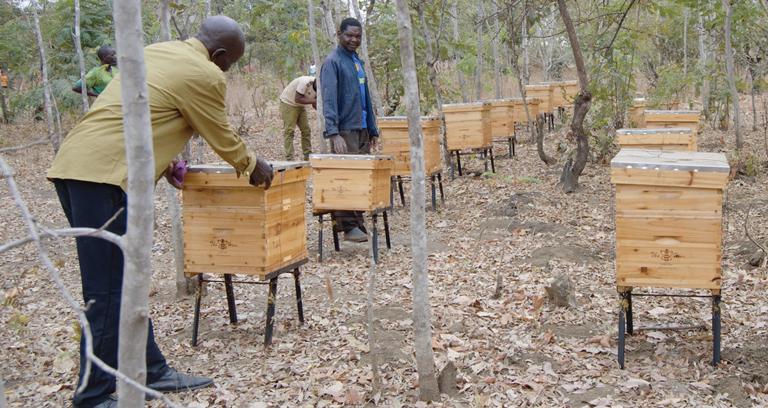Transforming farmers’ agony into jubilation
Middle-aged Salayi Mkanasi’s 20-year-old marriage has, until lately, been one torturous expedition laced with poverty that bled endless hunger, severe neediness and a bleak future.
Based in Nkanile Village, Traditional Authority Masasa in Kasungu district, Mkanasi thoughtfully recalls, albeit with bitterness, that the peak of her torture was when she fell pregnant in 2004.

“I used to walk for three hours, on an empty stomach, to visit hospital for antenatal care. When I was seven months pregnant, I weighed a meagre 25 kilogrammes.
“One of the medical officers was deeply shocked with my situation so much that he personally donated 10-kilogramme of flour to help improve my weight,” Mkanasi recollects.
A month before she was due to deliver, she gave birth to a premature daughter. But then, her husband could not afford to buy a sling for their newly-born. Instead, a doctor donated a bed sheet.
It got worse.
“For years, we used my husband’s jacket as our child’s makeshift blanket. The father and myself slept without any bedding. We were like wild animals,” she opens up further as her face drops.
But now, Mkanasi’s family has taken a better spin after they quit less-paying employment as labourers on tobacco farms to venture into farming.
“We were tipped in 2019 that there were projects being implemented in our village, where farmers were being trained on modern farming. We decided to quit our less-paying but laborious jobs and return home.
“We learnt a lot through the trainings and received free farm inputs such as seeds. Using manure and a little of chemical fertiliser, we produced 10 bags of soybeans and 26 bags of maize,” she says, her face glowing.
For a family that was surviving on a pitiful 10-kilogramme flour, the yield was a strong armour against food insecurity which has been haunting them for ages.
After selling part of their produce, Mkanasi says she ventured into a soap and zitenje business, bought a bicycle to ease transportation of farm produce and secured shares in the village bank where she obtains soft loans to boost her business.
“We are not yet where we want to be but we have made significant progress. We now have blankets, which were once a luxury. Those that have experienced life like us, can appreciate what I am talking about,” she says.
The projects that have revolutionalised Mkanasi’s family status and those of other farmers are European Union (EU)-funded Kulima and Afikepo being implemented by the Food and Agriculture Organisation (FAO) in collaboration with the government.
They aim at improving production and promoting nutrition-sensitive agriculture.
Kulima is supporting implementation of Farmer Field School (FFS), a participatory learning approach which enables farmers through season-long field learning, to address challenges in their local context, according to FAO.
The project seeks to train 600 extension workers as master trainers and 8 000 lead farmers as community-based facilitators (CBFs).
On the other end, Afikepo, which targets 675 000 households, aims at improving accessibility to affordable, diversified and nutritious foods for all seasons among under-five children, adolescent girls, pregnant and lactating women.
“The project is a community outreach initiative aimed at disseminating information and improving knowledge for behaviour change when it comes to nutrition,” FAO says in its project overview.
In Salima district’s Traditional Authority Khombedza, a 20-member Msambafumu Farmers Club has benefited massively from twin projects as honey producers and banana suckers’ multipliers while also carving into full-blown horticulture husbandry.
The club’s chairperson Naphtali Abel Zamangwe, discloses that FAO donated to them 25 beehives which produce them 500 litres of honey valued at around K3 million per harvesting period, which is once or twice a year.
“In addition to that, two years ago, FAO gave us 395 banana suckers which we multiply and sell. Our early rounds of multiplication earned us around K1.8 million,” he says.
Zamangwe discloses that they are ploughing their earnings back to enhancing production. They have purchased a diesel-powered generator to supplement their solar system which has been failing to meet the way supply demand amidst continued expansion of their farms.
In Kabyanga Village in Traditional Authority Mwadzama on the outskirts of Nkhotakota district, Abdullah Suleiman is busy tying tomato-laden stems to stakes on his two-acre farm.
Suleiman has for years been relying on rice farming as his major source of income. Not anymore.
“After enrolling in the farmers’ field school, I learnt about how to succeed with tomato farming. I have already found it more profitable than rice which is labour-intensive and more prone to climatic changes.
“A small portion of the two acres on which I grew tomato has already earned me K900 000. I expect to earn more once I sell all the tomato. I will be growing tomatoes three times a year. I expect to be filthy rich,” he says, with a mischievous smile.
Kulima and Afikepo are being implemented in Karonga, Chitipa, Nkhata Bay, Mzimba, Nkhotakota, Salima, Kasungu, Chiradzulu, Thyolo and Mulanje districts.
Through the farmers field and business schools 30 000 of the smallholder farming households under Kulima are also benefiting from the Marketing Capacity Building (MCB). It is being financed by the Government of Flanders.
One of the key outcomes is to see an increased number of smallholder farmers organised in formal groups and producing for the market, FAO says. As rising costs of farm inputs and natural disasters test the country’s agricultural systems Kulima, Afikepo and MCB are offering the much-needed resilience—more like the triple doses rallied in one injection.





